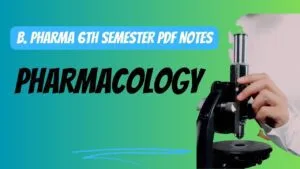Pharmacology III – B. Pharma 6th Semester Notes Pdf

Scope: This subject Pharmacology is intended to impart fundamental knowledge on various aspects (classification, mechanism of action, therapeutic effects, clinical uses, side effects, and contraindications) of drugs acting on the respiratory and gastrointestinal system, infectious diseases, immuno-pharmacology and in addition, emphasis on the principles of toxicology and chronopharmacology.
Objectives: Upon completion of this course the student should be able to:
1. Understand the mechanism of drug action and its relevance in the treatment of different infectious diseases
2. Comprehend the principles of toxicology and treatment of various poisonings
3. Appreciate the correlation of pharmacology with related medical sciences.
Course Content:
Pharmacology III UNIT-I
1. Pharmacology of drugs acting on the Respiratory system
a. Anti-asthmatic drugs
b. Drugs used in the management of COPD
c. Expectorants and antitussives
d. Nasal decongestants
e. Respiratory stimulants
2. Pharmacology of drugs acting on the Gastrointestinal Tract
a. Antiulcer agents.
b. Drugs for constipation and diarrhoea.
c. Appetite stimulants and suppressants.
d. Digestants and carminatives.
e. Emetics and anti-emetics.
Pharmacology III UNIT-II
3. Chemotherapy
a. General principles of chemotherapy.
b. Sulfonamides and cotrimoxazole.
c. Antibiotics- Penicillins, cephalosporins, chloramphenicol, macrolides, quinolones and fluoroquinolins, tetracycline and aminogl ycosides
Pharmacology III UNIT-III
3. Chemotherapy
a. Antitubercular agents
b. Antileprotic agents
c. Antifungal agents
d. Antiviral drugs
e. Anthelmintics
f. Antimalarial drugs
g. Antiamoebic agents
Pharmacology III UNIT-IV
3. Chemotherapy
Urinary tract infections and sexually transmitted diseases. Chemotherapy of malignancy.
4. Immunopharmacology
a. Immunostimulants
b. Immunosuppressant
Protein drugs, monoclonal antibodies, target drugs to antigen, biosimilars
Pharmacology III UNIT-V
5. Principles of toxicology
a. Definition and basic knowledge of acute, subacute, and chronic toxicity.
b. Definition and basic knowledge of genotoxicity, carcinogenicity, teratogenicity and mutagenicity
c. General principles of treatment of poisoning
d. Clinical symptoms and management of barbiturates, morphine, organophosphosphorus compound, and lead, mercury, and arsenic poisoning.
6. Chronopharmacology
a. Definition of rhythm and cycles.
b. Biological clock and their significance leading to chronotherapy.
Pharmacology notes b pharma 6th semester
Pharmacology-III (Practical)
1. Dose calculation in pharmacological experiments
2. Antiallergic activity by mast cell stabilization assay
3. Study of anti-ulcer activity of a drug using pylorus ligand (SHAY) rat model and NSAIDS induced ulcer model.
4. Study of the effect of drugs on gastrointestinal motility
5. Effect of agonist and antagonists on guinea pig ileum
6. Estimation of serum biochemical parameters by using semi- autoanalyzer
7. Effect of saline purgative on frog intestine
8. Insulin hypoglycemic effect in rabbit
9. Test for pyrogens (rabbit method)
10. Determination of acute oral toxicity (LD50) of a drug from a given data
11. Determination of acute skin irritation/corrosion of a test substance
12. Determination of acute eye irritation/corrosion of a test substance
13. Calculation of pharmacokinetic parameters from a given data
14. Biostatistics methods in experimental pharmacology (student’s t-test, ANOVA)
15. Biostatistics methods in experimental pharmacology (Chi square test, Wilcoxon Signed Rank test)
*Experiments are demonstrated by simulated experiments/videos
Recommended Books (Latest Editions)
1. Rang H. P., Dale M. M., Ritter J. M., Flower R. J., Rang and Dale’s Pharmacology, Churchil Livingstone Elsevier
2. Katzung B. G., Masters S. B., Trevor A. J., Basic and clinical pharmacology, Tata Mc Graw-Hill
3. Goodman and Gilman’s, The Pharmacological Basis of Therapeutics
4. Marry Anne K. K., Lloyd Yee Y., Brian K. A., Robbin L.C., Joseph G. B., Wayne A. K., Bradley R.W., Applied Therapeutics, The Clinical use of Drugs. The Point Lippincott Williams & Wilkins
5. Mycek M.J, Gelnet S.B and Perper M.M. Lippincott’s Illustrated Reviews- Pharmacology
6. K.D.Tripathi. Essentials of Medical Pharmacology, JAYPEE Brothers Medical Publishers (P) Ltd, New Delhi.
7. Sharma H. L., Sharma K. K., Principles of Pharmacology, Paras medical publisher Modern Pharmacology with clinical Applications, by Charles R.Craig& Robert,
8. Ghosh MN. Fundamentals of Experimental Pharmacology. Hilton & Company, Kolkata,
9. Kulkarni SK. Handbook of experimental pharmacology. VallabhPrakashan,
10. N.Udupa and P.D. Gupta, Concepts in Chronopharmacology.
Also, Visit: Pharmacology Notes for Pharmacy Students
